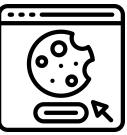Cookie
Definition
Cookies are text files that include small bits of information, such as a login and password, and are used to recognise your machine when you’re connected to a computer network.
Description
It gets convenient to browse for information when the system remembers the user’s preference. This is where a cookie can help. Cookies are typically used to remember user preferences, login credentials, and other information related to a user’s interaction with the website or application.

Cookies can also track user behaviour and gather data for analytics and advertising purposes. Cookies are commonly used in web development and are supported by most modern web browsers.
Importance of Cookies
Cookies are important for several reasons:
Personalization: Cookies can be used to remember a user’s preferences and settings, such as language preference, font size, and colour scheme. This can improve the user experience by making the website more personalised and tailored to users’ needs.
User Authentication: Cookies are often used to authenticate and keep users logged in. This means that users do not need to log in every time they visit a website, which can save time and improve the user experience.
Session Management: It can be used to track a user’s session on a website, which helps maintain the state between pages and ensure that user data is consistent.
Session Management: Cookies can be used to track a user’s session on a website, which helps maintain the state between pages and ensure that user data is consistent.
Analytics and Advertising: It can be used to track user behaviour on a website and gather data for analytics and advertising purposes. This can help website owners to better understand their audience and optimise their websites for better performance.
How does cookies work?
This is how a cookie work:
- The user visits a website for the first time: When a user visits a website for the first time, the website sends a small data file to the user’s browser, which is stored on the user’s device. This data file is called a cookie.
- The browser stores the cookie: The browser keeps the cookie on the user’s device, typically in a designated folder or cache.
- The user returns to the website: When the user returns to the website, the browser sends the cookie back to the website.
- The website reads the cookie: The website can then read the information in the cookie, such as user preferences, login credentials, or other data.
- The website uses the information: The website can use the information in the cookie to personalise the user’s experience, keep the user logged in, or perform other functions.
- The cookie can be updated or deleted: The website can edit or delete the information in the cookie as needed and set an expiration date to ensure that it is not stored indefinitely.
- Users can manage cookies: Users can block or delete cookies anytime through their browser settings.
What is the future of cookies in marketing?
Here are some key points about the future of cookies in marketing:
- Changes in browser and privacy regulations make it more difficult for advertisers to track user behaviour and deliver targeted advertising using cookies.
- First-party data and alternative technologies, such as machine learning and artificial intelligence, can personalise user experiences and deliver targeted advertising without relying on cookies.
- Marketers must adapt to new technologies and strategies to continue delivering personalised and effective marketing campaigns.
How to capture data without cookies?
There are several ways to capture data without relying on traditional cookies:
- Device fingerprinting: Device fingerprinting involves collecting information about a user’s device, such as the device’s operating system, browser version, and screen resolution. This information can be used to create a unique identifier for the device, which can be used to track the user’s behaviour and deliver personalised content and advertising.
- IP tracking: IP tracking involves collecting the IP address of a user’s device, which can be used to determine their approximate location and track their behaviour. This information can be used to deliver personalised content and advertising.
- Login and registration data: Marketers can collect data from users when they log in or register for a website or app. This data can include personal information such as the user’s name, email address, and preferences. This information can be used to deliver personalised content and advertising.
- Analytics tools: Marketers can use analytics tools such as Google Analytics to collect data about user behaviour on a website or app. This data can include page views, session length, and user demographics. This information can improve the user experience and deliver targeted advertising.
- Surveys and feedback: Marketers can collect user data through surveys and feedback forms. This data can include information about user preferences, interests, and behaviours. This information can be used to deliver personalised content and advertising.
Benefits of Cookie
Cookies offer several benefits for both website owners and users. Here are some of the key benefits of cookies:
- Personalization: It allow website owners to personalise the user experience based on the user’s previous interactions with the website. For example, cookies can be used to remember a user’s login information, language preference, or shopping cart contents.
- Convenience: It makes it more convenient for users to navigate a website by remembering their preferences and settings. For example, cookies can remember a user’s preferred language or font size, so they don’t have to set it every time they visit the website.
- Analytics: It can be used to collect data about user behaviour on a website, such as pageviews, session length, and user demographics. This data can be used to improve the user experience and make data-driven decisions about website design and content.
- Advertising: It can be used to deliver targeted advertising to users based on their browsing history and behaviour. This can help advertisers reach their target audience more effectively and improve the return on investment for their advertising campaigns.
FAQ
What is a cookie?
A cookie is a small text file stored on a user’s computer or mobile device when they visit a website.
What is the purpose of a cookie?
The purpose of a cookie is to remember user preferences and settings, provide personalised content and advertising, and collect data about user behaviour on a website.
Are cookies safe?
Yes, cookies are generally considered safe. They cannot access any information stored on a user’s computer or mobile device, and they do not contain any viruses or malware.
Can I block cookie?
Yes, most web browsers allow users to block or delete cookies. However, blocking cookies may affect certain websites’ functionality and user experience.
What is the difference between first-party and third-party cookies?
First-party cookies are set by the website the user is visiting, while third-party cookies are set by a domain other than the one the user is visiting.
Why are cookies important for online advertising?
Cookies are important for online advertising because they allow advertisers to track user behaviour and deliver targeted advertising based on that behaviour.
What are some alternatives to cookie for tracking user behaviour?
Alternatives to cookies for tracking user behaviour include device fingerprinting, IP tracking, login and registration data, analytics tools, and surveys and feedback.
What is the future of cookie in marketing?
The future of cookie in marketing is still being determined due to changes in browser and privacy regulations. Marketers will need to adapt to new technologies and strategies to deliver personalised and effective marketing campaigns.





We would love to have your opinion.